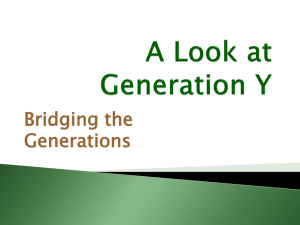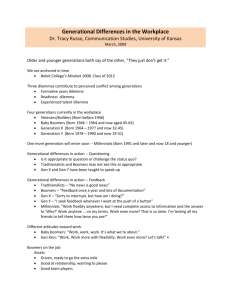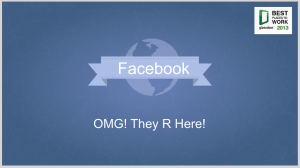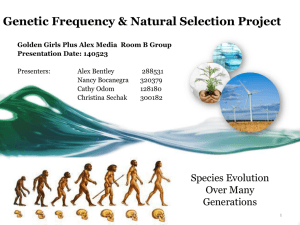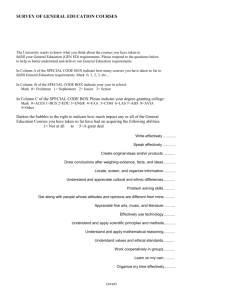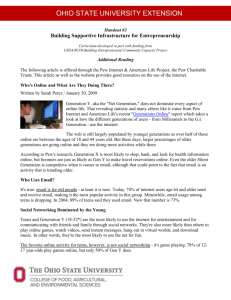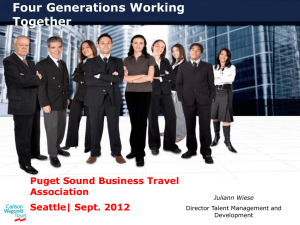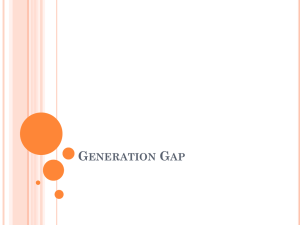PowerPoint
advertisement
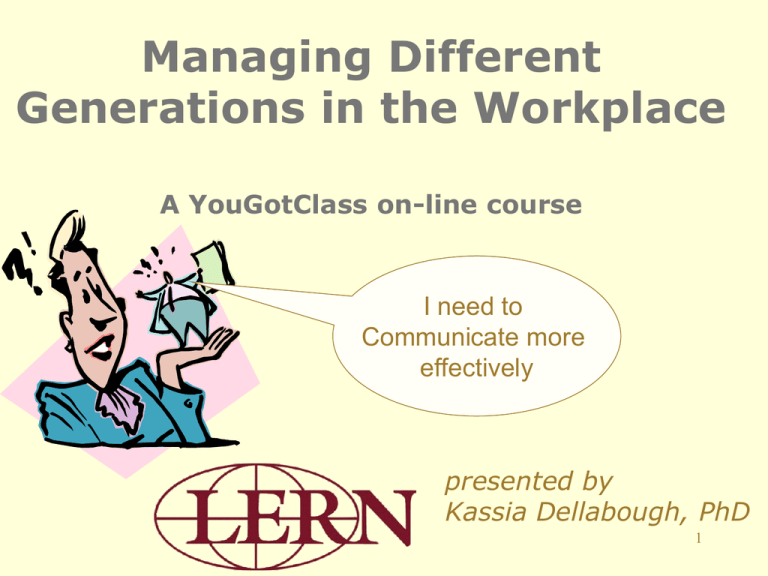
Managing Different Generations in the Workplace A YouGotClass on-line course I need to Communicate more effectively presented by Kassia Dellabough, PhD 1 Emerging Issues at Work 2 Global Work Environment The Pew Internet & American Life project 3 Generational Communication Did you get my e-mail? What happened to the work ethic? Wassup? Get my text? I sent a memo This is a waste of time, I work better alone Were you at the meeting? He called me that he can’t make it 4 Course Agenda Unit 1 - What makes these generations different ? The transition from the Industrial Age to the Internet Age How Gen X, Boomers, Gen Y differ Work values in the 21st Century 5 Course Agenda Unit 2 - How Gen X and Gen Y perceive time. Knowledge work and the value of time Time as key to profitability The focus on outcomes Meetings the work 6 Course Agenda Unit 3 - What motivates Gen X and Gen Y at work? The reinvention of family Work hard and play hard Monetary and non-monetary rewards The new career development path 7 Course Agenda Unit 4 - Work styles and technology Customizing work styles & process Peak work time and place A new role for technology at work Working collaboratively And what about the NEXT Generation? 8 YOUR GOALS 9 Communication 10 Inventions That Changed the Way We Communicate The car Telephone Airplane Answering machine Computers E-mail Cell phones Digital cameras Cloud computing 11 Innovations in Communication Ball Point Pen 1945 Telegraph 1828 Radio - 1866 Television 1930’s Airplanes - 1903 Telephone 1870’s 12 1980 1990 1995 2000 2002 2004 2006 2008 2010 •VOIP •Podcasts •Fax •Wikki / Forums •YouTube •Web •Modem •Survey Monkey •MySpace •Email •Answering •Zoomerang •Web Support •PowerPoint Machine •E-Commerce •CraigsList •Voice Mail •Newsletters •Skype •Cell Phone •Amazon •Blackberry •Newsletter •PDA •Digital •Instant •BBS •RSS Feeds Signage Messenger •Pagers •Blogs •Videophone •Contact •Ebay •TeleManagers •Google commuting •Paypal 13 Preferred Communication Tools SENIORS: face-to-face, phone (landline), U.S. mail, newspapers, magazines BOOMERS: email, phone, face-to-face, newspapers, magazines, on-line resources GEN X: web sites, email, on-line newspapers & resources, cell phone GEN Y: Facebook (etc.), Text, Cell Phone, web sites, skype GEN NEW - ? 14 Cell phone or Computer? A long way from DOS… 15 Defining the Generations* Seniors 1920 – 1944 Baby Boomer 1946-1964 Generation X 1965-1980 Generation Y 1981-2000 Generation Next? I, X, G 2000- now 16 GENERATIONS: The Cohort Experience Members of a generation are linked by experiences shared during their formative years. These shared experiences contribute to the creation of shared values, attitudes and behaviors. 17 What Were YOU doing in High School? Favorite music Values: Work, sexual behavior, drugs, dress How did you refer to your teachers? What did you do after school? How did you stay in touch with your friends? What was the political climate? What were your career goals? What was the job outlook? What was the technology of the day? 18 Generation Gaps Attitudes Expectations Perceive Differently Learn Differently Teach Differently Work Differently 19 Learning Working Marketplace Behaviors 20 Loyal, the recycling generation 21 Daily Life and Society: •Prosperity •Stability •uniform 22 The Baby Boomers Born: 1946-1964 McCarthy Hearings Polio Vaccine Rosa Parks Sputnik First Nuclear Power Plant JFK Peace Corps Cold War John Glenn Vietnam Martin Luther King Woodstock Kent State 23 24 Understanding Generation X Photo, Courtesy of Grease, Tattoos from Grease, St. Paul Minnesota (http://tattoosfromgrease.com/) 25 I AM NOT A BABY BOOMER! Work “under the radar” 26 The Millennial Gen Y 27 Who is Generation Y? 28 78 Million People Technology Savvy 20,000 TV commercials/year since birth Most media savvy generation Confident Optimistic Politically active 29 The NEXT Generation…… 30 Course Outcomes • Find out how your coworkers in other generations approach work • discover something new about yourself and your generation. • Get an understanding of each of the four generations. Course Outcomes • Learn the distinguishing characteristics of each that impact their approach to the workplace. • Take back practical tips and techniques for communicating generationally in the workplace. Next Class April 7 - May 2, 2014 questions? Contact kassia@uoregon.edu 33

